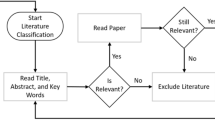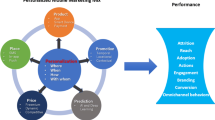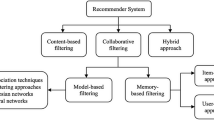Abstract
The business owners have significantly focused on improving the business to business (B2B) services to enhance business productivity. Numerous methods have already been proposed for the personalized end users recommendation systems, but there are no such attempts for business owners. The business customers buying processes consists of various marketing campaign requirements to promote their services or products effectively. It requires an intelligent B2B marketing campaigns recommendation system to meet the business goals for business customers. The B2B marketing campaigns recommendations are required to increase the business earning, but complex items and user profiles lead to challenging research problems. To end this, we propose a novel framework for intelligent B2B marketing campaign recommendations using the fuzzy preference (FP) personalized temporal graph (PTG) and low-rank graph reconstruction (LRGR). The proposed model FP-PTG-LRGR consists of three steps such as pre-processing, hybrid preference extractions, and recommendations. We first designed pre-processing algorithm using natural language processing (NLP) to remove the noisy data. The pre-processing is required to enhance the reliability and accuracy of recommendations. After that, we proposed the hybrid behavior analysis technique called FP-PTG model for extracting the business customer’s preferences. FP-PTG aims to represent the buying process information of every business customer accurately. The FP technique is integrated with PTG to overcome the crip/vague preferences that form the FP-PTG model. The B2B marketing campaign order preferences for personalized businesses have effectively represented and merged using FP-PTG. Finally, we applied LRGR to estimate the intelligent B2B marketing campaign recommendations for individual business customers by discovering the unobserved edges in FP-PTG. We have performed experimental studies using publically available B2B marketing datasets, and outcomes claim that FP-PTG-LRGR outperformed existing methods for B2B marketing campaign recommendations. Experimental results of FP-PTG-LRGR show the improvement of precision rate by 11.5%, recall rate by 11.23%, and accuracy by 12.11%.












Similar content being viewed by others
Data availability
The datasets generated during and/or analysed during the current study are not publicly available due to ongoing study for PHD research, but are available from the corresponding author on reasonable request.
References
Adomavicius G, Tuzhilin A (2005) Toward the next generation of recommender systems: a survey of the state-of-the-art and possible extensions. IEEE Trans Knowl Data Eng 17(6):734–749. https://doi.org/10.1109/tkde.2005.99
Alhayani B, Abbas ST, Mohammed HJ, Mahajan HB (2021) Intelligent secured two-way image transmission using corvus corone module over WSN. Wirel Pers Commun. https://doi.org/10.1007/s11277-021-08484-2
Anwar T, Uma V (2019) A review of recommender system and related dimensions. In: Shukla RK, Agrawal J, Sharma S, Singh Tomer G (eds) Data, engineering and applications. Springer, Singapore. https://doi.org/10.1007/978-981-13-6347-4_1
Ayyaz S, Qamar U, Nawaz R (2018) HCF-CRS: a hybrid content based fuzzy conformal recommender system for providing recommendations with confidence. PLoS One 13(10):e0204849
Becker W, Schmid O (2020) The right digital strategy for your business: an empirical analysis of the design and implementation of digital strategies in SMEs and LSEs. Bus Res 13:985–1005. https://doi.org/10.1007/s40685-020-00124-y
Bertsimas DJ, Mersereau AJ, Patel NR (2003) Dynamic classification of online customers. In: Proceedings of the 2003 SIAM international conference on data mining, pp 107–118. https://doi.org/10.1137/1.9781611972733.10
Bose I, Chen X (2009) Quantitative models for direct marketing: a review from systems perspective. Eur J Oper Res 195(1):1–16. https://doi.org/10.1016/j.ejor.2008.04.006
Chen C, Duh L (2008) Personalized web-based tutoring system based on fuzzy item response theory. Expert Syst Appl 34(4):2298–2315. https://doi.org/10.1016/j.eswa.2007.03.010
Chen R, Chang YS, Hua Q et al (2020) An enhanced social matrix factorization model for recommendation based on social networks using social interaction factors. Multimed Tools Appl 79:14147–14177. https://doi.org/10.1007/s11042-020-08620-3
Chua FCT, Lauw HW, Lim E-P (2013) Generative models for item adoptions using social correlation. IEEE Trans Knowl Data Eng 25(9):2036–2048. https://doi.org/10.1109/tkde.2012.137
Dreyer S, Olivotti D, Lebek B et al (2019) Focusing the customer through smart services: a literature review. Electron Mark 29:55–78. https://doi.org/10.1007/s12525-019-00328-z
Fang T, Fu X (2020) Development status and marketing strategy of smart speakers. In: Kantola J, Nazir S, Salminen V (eds) Advances in human factors, business management and leadership. AHFE 2020. Advances in Intelligent Systems and Computing, vol 1209. Springer, Cham. https://doi.org/10.1007/978-3-030-50791-6_71
Fauska P, Kryvinska N, Strauss C (2013) E-commerce and B2B services enterprises. In: 2013 27th International conference on advanced ınformation networking and applications workshops. https://doi.org/10.1109/waina.2013.98
Fetaji M, Morina L, Fetaji B (2017) Devising and evaluating B2B conceptual model for B2B portal for mobile interactive devices using Mann-Whitney U test. In: 2017 6th Mediterranean conference on embedded computing (MECO). https://doi.org/10.1109/meco.2017.7977139
Grewal R, Lilien GL, Bharadwaj S et al (2015) Business-to-business buying: challenges and opportunities. Cust Need Solut 2:193–208. https://doi.org/10.1007/s40547-015-0040-5
Heckel R, Vlachos M, Parnell T, Duenner C (2017) Scalable and ınterpretable product recommendations via overlapping co-clustering. In: 2017 IEEE 33rd international conference on data engineering (ICDE). https://doi.org/10.1109/icde.2017.149
Joshi S, Dubey J (2020) Restaurant recommendation system based on novel approach using K-means and Naïve Bayes classifiers. In: Mandal J, Mukhopadhyay S (eds) Proceedings of the global AI congress 2019. Advances in Intelligent Systems and Computing, vol 1112. Springer, Singapore. https://doi.org/10.1007/978-981-15-2188-1_48
Koppius O, van Heck E (2005) Supply and demand driven coordination in smart business networks. In: Vervest P, van Heck E, Pau LF, Preiss K (eds) Smart business networks. Springer, Berlin. https://doi.org/10.1007/3-540-26694-1_19
Koren Y, Bell R, Volinsky C (2009) Matrix factorization techniques for recommender systems. Computer 42(8):30–37. https://doi.org/10.1109/mc.2009.263
Li X (2009) The optimal procurement strategies for online spot markets with B2B E-market. In: 2009 International conference on management and service science. https://doi.org/10.1109/icmss.2009.5302531
Lin Z, Chen H (2019) Recommendation over time: a probabilistic model of time-aware recommender systems. Sci China Inf Sci 62:212105. https://doi.org/10.1007/s11432-018-9915-8
Liu NN, He L, Zhao M (2013) Social temporal collaborative ranking for context aware movie recommendation. ACM Trans Intell Syst Technol 4(1):1–26. https://doi.org/10.1145/2414425.2414440
Liu H, Jing L, Yu J, Ng MK-P (2019) Social recommendation with learning personal and social latent factors. IEEE Trans Knowl Data Eng. https://doi.org/10.1109/tkde.2019.2961666
Lu Y, Tsaparas P, Ntoulas A, Polanyi L (2010) Exploiting social context for review quality prediction. In: Proceedings of the 19th ınternational conference on world wide web - WWW ’10. https://doi.org/10.1145/1772690.1772761
Mahajan HB, Badarla A (2018) Application of ınternet of things for smart precision farming: solutions and challenges. Int J Adv Sci Technol 2018:37–45
Mahajan HB, Badarla A (2021a) Cross-layer protocol for WSN-assisted IoT smart farming applications using nature inspired algorithm. Wirel Pers Commun. https://doi.org/10.1007/s11277-021-08866-6
Mahajan HB, Badarla A, Junnarkar AA (2021b) CL-IoT: cross-layer Internet of Things protocol for intelligent manufacturing of smart farming. J Ambient Intell Human Comput 12:7777–7791. https://doi.org/10.1007/s12652-020-02502-0
Mikhail A, Kamil IA, Mahajan H (2017a) Increasing SCADA system availability by fault tolerance techniques. In: 2017 International conference on computing, communication, control and automation (ICCUBEA). https://doi.org/10.1109/iccubea.2017.8463911
Mikhail A, Kareem HH, Mahajan H (2017b) Fault tolerance to balance for messaging layers in communication society. In: 2017 International conference on computing, communication, control and automation (ICCUBEA). https://doi.org/10.1109/iccubea.2017.8463871
Monti D, Rizzo G, Morisio M (2021) A systematic literature review of multicriteria recommender systems. Artif Intell Rev 54:427–468. https://doi.org/10.1007/s10462-020-09851-4
Oprea A, Schallhorn T, Ziegler C-N, Eggs H, Lausen G (2013) A hybrid B2B app recommender system
Osadchiy T, Poliakov I, Olivier P, Rowland M, Foster E (2018) Recommender system based on pairwise association rules. Expert Syst Appl 115:535–542
Pau LF (2014) Discovering the dynamics of smart business networks. Comput Manag Sci 11:445–458. https://doi.org/10.1007/s10287-013-0162-x
Porcel C, López-Herrera AG, Herrera-Viedma E (2009) A recommender system for research resources based on fuzzy linguistic modeling. Expert Syst Appl 36(3):5173–5183. https://doi.org/10.1016/j.eswa.2008.06.038
Shambour Q, Lu J (2015) An effective recommender system by unifying user and item trust information for B2B applications. J Comput Syst Sci 81(7):1110–1126. https://doi.org/10.1016/j.jcss.2014.12.029
Song J (2013) Study on the business model of tourism electronic commerce in China. In: Du Z (eds) Intelligence computation and evolutionary computation. Advances in Intelligent Systems and Computing, vol 180. Springer, Berlin. https://doi.org/10.1007/978-3-642-31656-2_132
Tang X, Zhou J (2013) Dynamic personalized recommendation on sparse data. IEEE Trans Knowl Data Eng 25(12):2895–2899. https://doi.org/10.1109/tkde.2012.229
Terán L (2020) A literature review for recommender systems techniques used in microblogs. Dynamic profiles for voting advice applications. Fuzzy management methods. Springer, Cham. https://doi.org/10.1007/978-3-030-24090-5_3
Vieira VA, de Almeida MIS, Agnihotri R et al (2019) In pursuit of an effective B2B digital marketing strategy in an emerging market. J Acad Mark Sci 47:1085–1108. https://doi.org/10.1007/s11747-019-00687-1
Vlachos M, Vassiliadis VG, Heckel R, Labbi A (2016) Toward interpretable predictive models in B2B recommender systems. IBM J Res Dev 60(5/6):11:1-11:12. https://doi.org/10.1147/jrd.2016.2602097
Wang J, Zhang Y (2013) Opportunity model for e-commerce recommendation. In: Proceedings of the 36th ınternational ACM SIGIR conference on research and development in ınformation retrieval - SIGIR ’13. https://doi.org/10.1145/2484028.2484067
Wu D, Zhang G, Lu J (2015) A fuzzy preference tree-based recommender system for personalized business- to-business e-services. IEEE Trans Fuzzy Syst 23(1):29–43. https://doi.org/10.1109/tfuzz.2014.2315655
Xiang L, Yuan Q, Zhao S, Chen L, Zhang X, Yang Q, Sun J (2010) Temporal recommendation on graphs via long- and short-term preference fusion. In: Proceedings of the 16th ACM SIGKDD international conference on knowledge discovery and data mining - KDD ’10. https://doi.org/10.1145/1835804.1835896
Yager RR (2003) Fuzzy logic methods in recommender systems. Fuzzy Sets Syst 136(2):133–149. https://doi.org/10.1016/s0165-0114(02)00223-3
Yan S (2014) Design and analysis of the regionaly B2B e-commerce system. In: 2014 Sixth international conference on measuring technology and mechatronics automation. https://doi.org/10.1109/icmtma.2014.53
Yang X, Steck H, Liu Y (2012) Circle-based recommendation in online social networks. In: Proceedings of the 18th ACM SIGKDD international conference on knowledge discovery and data mining - KDD ’12. https://doi.org/10.1145/2339530.2339728
Yang J, Liu C, Teng M, Xiong H, Liao M, Zhu V (2015) Exploiting temporal and social factors for B2B marketing campaign recommendations. In: 2015 IEEE ınternational conference on data mining. https://doi.org/10.1109/icdm.2015.71
Yang J, Liu C, Teng M, Chen J, Xiong H (2018) A unified view of social and temporal modeling for B2B marketing campaign recommendation. IEEE Trans Knowl Data Eng 30(5):810–823. https://doi.org/10.1109/tkde.2017.2783926
Yap G-E, Li X-L, Yu PS (2012) Effective next-ıtems recommendation via personalized sequential pattern mining. Lecture Notes in Computer Science, pp 48–64. https://doi.org/10.1007/978-3-642-29035-0_4
Yuan J, Yang C (2012) Credit risk measurement on customers of B2B market. In: 2012 Second ınternational conference on business computing and global ınformatization. https://doi.org/10.1109/bcgin.2012.28
Zadeh LA (1965) Fuzzy sets. Inf Control 8(3):338–353. https://doi.org/10.1016/s0019-9958(65)90241-x
Zenebe A, Norcio AF (2009) Representation, similarity measures and aggregation methods using fuzzy sets for content-based recommender systems. Fuzzy Sets Syst 160(1):76–94. https://doi.org/10.1016/j.fss.2008.03.017
Zenebe A, Zhou L, Norcio AF (2010) User preferences discovery using fuzzy models. Fuzzy Sets Syst 161(23):3044–3063. https://doi.org/10.1016/j.fss.2010.06.006
Zhou H, Hirasawa K (2019) Evolving temporal association rules in recommender system. Neural Comput Appl 31:2605–2619. https://doi.org/10.1007/s00521-017-3217-z
Funding
No funding.
Author information
Authors and Affiliations
Corresponding author
Ethics declarations
Conflict of interest
All authors declares that they has no conflict of interest.
Ethical approval
This article does not contain any studies with human participants performed by any of the authors.
Additional information
Publisher's Note
Springer Nature remains neutral with regard to jurisdictional claims in published maps and institutional affiliations.
Rights and permissions
About this article
Cite this article
Patil, S., Vaze, V. & Agarkar, P. Intelligent business to business (B2B) marketing campaigns recommendation using personalized fuzzy preference temporal graph. J Ambient Intell Human Comput 14, 10219–10233 (2023). https://doi.org/10.1007/s12652-021-03684-x
Received:
Accepted:
Published:
Issue Date:
DOI: https://doi.org/10.1007/s12652-021-03684-x




